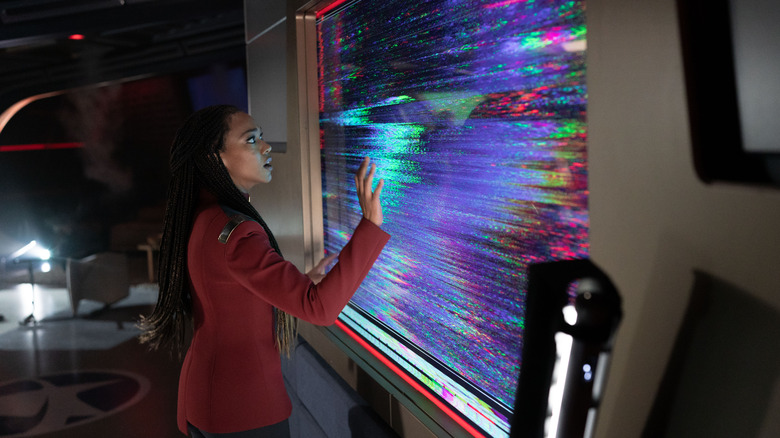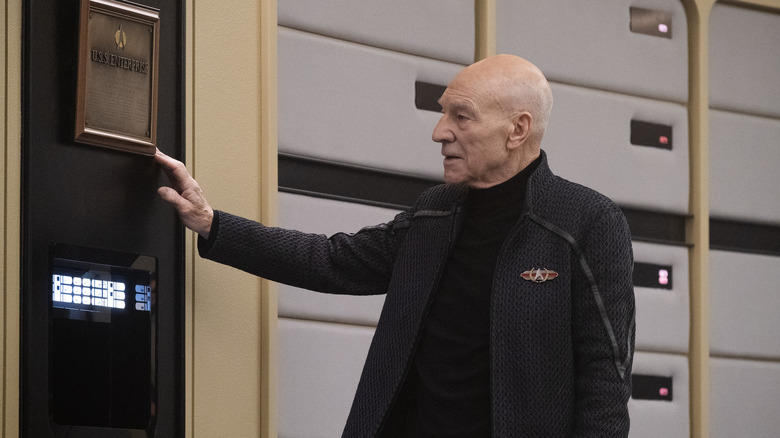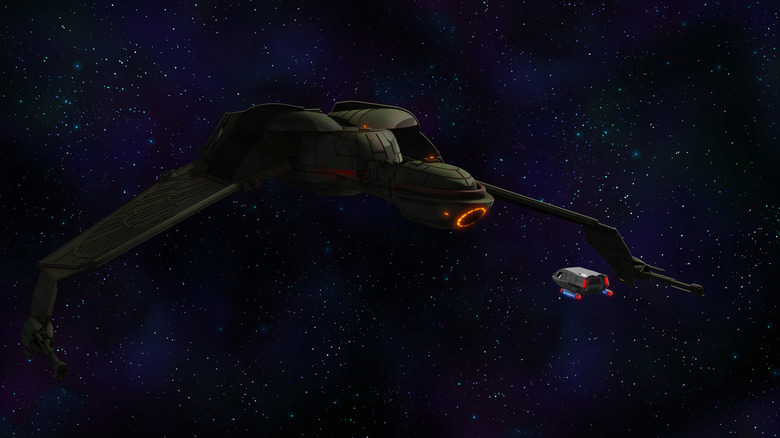Star Trek's Top Exec Has One Strict Rule For Any Future Shows
Since 2015, screenwriter and producer Alex Kurtzman has been the head honcho of "Star Trek" over at Paramount. Although Bryan Fuller came up with the initial idea for the streaming era's inaugural "Star Trek" series "Star Trek: Discovery," which debuted in 2017, it was Kurtzman who completely reworked the show from its origins, hence launching Paramount+ as an all-our-eggs-in-the-"Star"-"Trek"-franchise's-basket service. Kurtzman served as executive producer on all five "Star Trek" shows that began after "Discovery," including the now-concluded "Star Trek: Short Treks" and "Star Trek: Picard," as well as the soon-to-be-concluded "Star Trek: Prodigy" and "Star Trek: Lower Decks." Also soon to conclude is "Discovery" itself, which is currently partway through its fifth and final season.
As of this writing, "Star Trek: Strange New Worlds" is the only series that hasn't been definitively canceled, while the "Section 31" TV film has yet to stream. Also in the works is a "Starfleet Academy" series that is still in the early days of its production. Given the financial woes over at Paramount and the destruction wrought by the Streaming Wars, the future of "Star Trek" will most certainly be modest, if not downright austere. Apologies to the people who eagerly wanted to see the proposed "Star Trek: Legacy," a hyped potential spinoff from "Picard." That series will likely never be made.
On the "Star Trek" recap chat show "The Ready Room," hosted by Wil Wheaton, Kurtzman was asked about the future of "Star Trek," and the exec was, perhaps predictably, diplomatic. He couldn't very well say that that franchise was on fire, or that Paramount was actively taking a step back from one of its most lucrative properties, but he did say that he would follow a strict rule for any new "Star Trek" shows: there needs to be something to say.
The glut of Star Trek
Kurtzman admitted that he was just following the whims of creativity (and of the entertainment marketplace) when he started overseeing more and more "Star Trek" from 2017 to 2021, saying:
"[T]he truth is that when we started 'Discovery,' I wasn't thinking about that. I was just thinking about making a great show. And I fell so deeply in love with 'Discovery' and with the process of making it. I spent a lot of time that first season really kind of meditating on this incredible universe that has been around for so long, and how much more can be done with it; how many amazing stories there are to tell. There's really an infinite number of stories to tell."
One might argue that Kutrzman's stories are hit-and-miss. "Discovery" has just as many detractors as fans, and many agree that "Picard" only had one good season among its three (and even then, complaints can be made about "the good one"). One cannot deny, however, that the stories have been plentiful. Between the six shows that Kurtzman has overseen, there have been 210 episodes, with a promised 20 more on the way. If that number of episodes were applied to 1990s "Star Trek," it would equal almost nine full seasons in only six-and-a-half years. Never before, not even in its '90s heyday, did "Star Trek" produce the same sheer volume.
When moving forward, however, Kurtzman said he wanted the franchise to be about quality and not quantity. He may claim to have infinite stories, but there aren't, he said, infinite themes to dissect. Each potentially new "Star Trek" series, he feels, needs to have a point.
Enough of quantity, Star Trek needs more quality
In Kurtzman's own words:
"I only want to make another 'Star Trek' show if there's something special to say. I don't want to do it just to do more. I think that would be a huge disservice to 'Star Trek.' It would be a huge disservice to the fans. I think the fans would feel it instantaneously. They would know this is not authentic because if there's one thing that 'Trek' fans know, it's authenticity. So for me, it's really just about figuring out a way to make sure that we take our time, we're deliberate, we're thoughtful, and we deliver on the promise of something different every time."
Some of the harsher "Discovery" critics might immediately chime in, pleading that Kurtzman should have taken on that attitude seven years ago. Sadly, Kurtzman does not elucidate on what the current spate of "Star Trek" shows has been saying; it would have been nice if he gave a thematic rundown on how each individual show is about something specific. "Discovery," for instance, is about emotional turmoil and how workmates cling to each other for warmth. "Picard" is about how one frets over their legacy. "Lower Decks" is about workplace camaraderie and the quarter-life crisis, "Prodigy" is about maturity, and "Strange New Worlds" is about whimsy in the face of terror.
Kurtzman also doesn't mention what "Section 31" or "Starfleet Academy" might say.
Perhaps, however, Kurtzman wishes any future "Star Trek" shows to break a trend. Perhaps he feels that "Star Trek" hasn't been communicating enough in terms of philosophy, themes, and ideas, choosing instead to fall back on the bland efficiencies of storytelling. If we're to get more "Star Trek," like he said, we should expect more.


